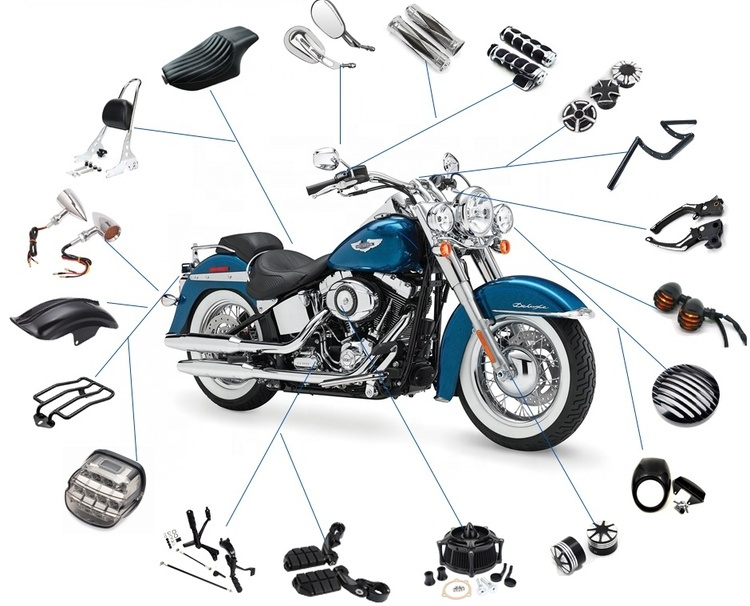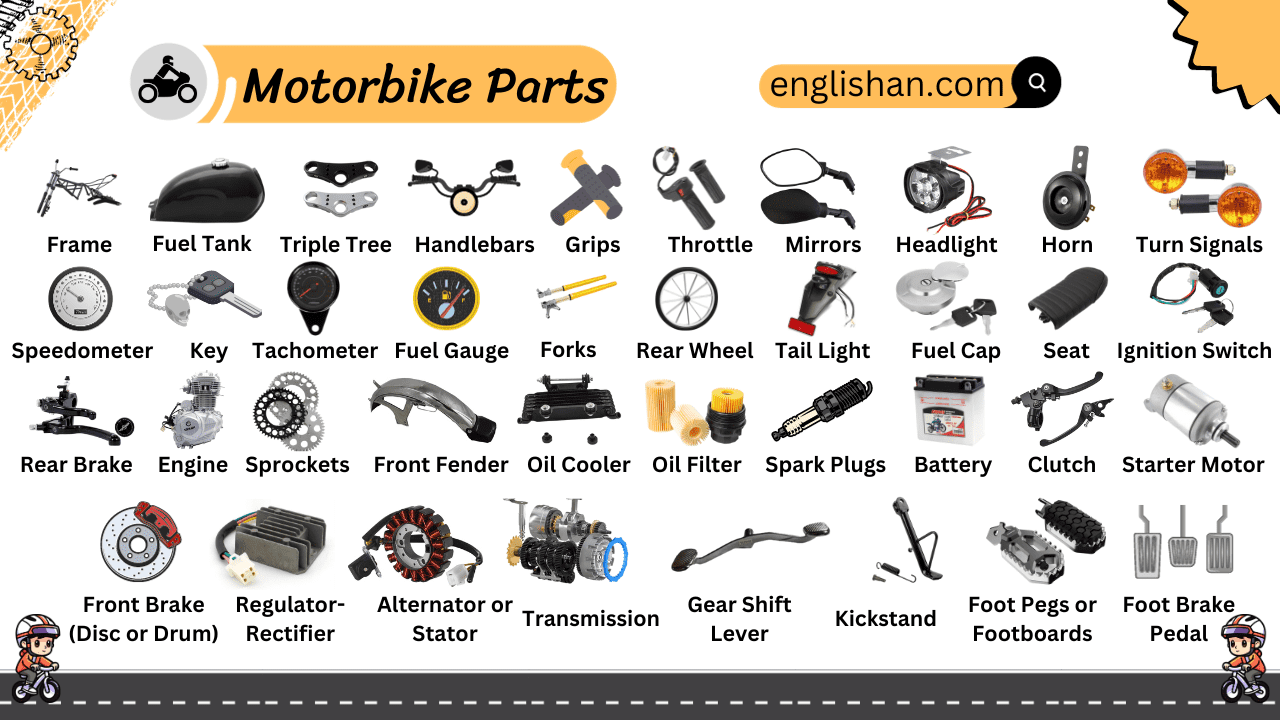How to Inspect and Replace Key Motorcycle Parts Auckland for Long-Term Reliability
How to Inspect and Replace Key Motorcycle Parts Auckland for Long-Term Reliability
Blog Article
Discover the Vital Motorcycle Components You Need for Ideal Performance
Recognizing the vital parts of a motorbike is basic for achieving peak efficiency. Each element, from the engine to the braking system, plays an important function in overall capability and security. Regular maintenance can prevent unexpected failings and enhance the riding experience. Lots of riders forget the ins and outs of these systems. Finding exactly how they function with each other can lead to an extra efficient ride. What critical components should every cyclist prioritize?
The Engine: The Heart of Your Motorcycle
The engine functions as the core part of a motorcycle, driving its performance and defining its abilities. It is responsible for transforming gas into mechanical power, which powers the bike forward. Numerous sorts of engines are utilized, including single-cylinder, V-twin, and inline arrangements, each offering distinctive features matched for various riding objectives and styles. The engine dimension, normally determined in cubic centimeters (cc), substantially affects efficiency, with larger engines usually providing even more power and torque.Furthermore, the engine's layout and technology, such as gas injection systems or air-cooling versus liquid-cooling, influence performance and reliability. Upkeep is necessary for peak procedure; aspects like routine oil adjustments and checking ignition system warranty longevity. Cyclists usually think about an engine's responsiveness and level of smoothness, as these features improve the overall riding experience. Eventually, the engine remains an important element that specifies not just the bike's efficiency however additionally the rider's link to the maker.
The Transmission: Moving Gears Smoothly
The transmission plays a vital function in a motorcycle's performance, especially in the technicians of equipment changing. Comprehending just how to change gears efficiently can boost the total riding experience, while regular upkeep warranties peak functionality. Appropriate interest to these aspects can considerably affect the durability and efficiency of the bike.

Equipment Shifting Mechanics
Smooth gear moving is necessary for suitable motorbike efficiency, significantly impacting both velocity and control. The mechanics of equipment moving include the interaction between the clutch, equipment bar, and transmission system. When a rider involves the clutch, it disengages the engine from the transmission, permitting a gear change without damaging the components. A well-timed launch of the clutch, combined with precise movement of the equipment lever, assists in a seamless change between gears. This process assures that the engine runs within its ideal power band, boosting performance. Bike Parts Wellington. In addition, understanding the equipment ratios and their impact on speed and torque can help riders make educated choices throughout changes, ultimately adding to a more satisfying and receptive riding experience
Upkeep Tips Relevance
Routine maintenance plays an important duty in guaranteeing that the transmission system operates successfully, enabling smooth equipment changes. Frequently altering the transmission and inspecting liquid is important, as old fluid can result in boosted friction and wear. Additionally, evaluating the clutch for wear assurances peak involvement and disengagement, preventing slippage throughout equipment changes. Lubrication of relocating parts is just as essential to reduce friction and enhance performance. Motorbike proprietors ought to likewise keep track of for leakages and unusual noises, as these can show underlying issues. By sticking to these maintenance pointers, cyclists can prolong the life-span of their transmission system, assuring that equipment changes remain smooth and adding to the overall performance of their motorcycle.
The Braking System: Ensuring Security on Every Experience
Braking systems are fundamental components that directly influence a motorbike's safety and security and efficiency. They include different parts, including brake pads, blades, calipers, and hydraulic lines, all working together to guarantee efficient deceleration. The type of braking system-- normally either disc or drum-- affects responsiveness and stopping power.Regular upkeep is crucial to copyright peak performance; worn brake pads can lead to reduced performance and boosted quiting ranges. Furthermore, the high quality of brake fluid should be kept track of, as it can absorb moisture gradually, compromising stopping efficiency.Riders must additionally think about the importance of anti-lock stopping systems (ABS), which avoid wheel lockup during sudden quits, boosting general safety and security. Appropriately working brakes are not almost stopping; they infuse confidence in the cyclist, enabling more secure navigation via various terrains. Ultimately, a reputable stopping system is critical for enjoying every adventure with assurance.
The Suspension: Enhancing Convenience and Control
A well-functioning suspension system greatly adds to a motorbike's total performance, matching the efficiency of the braking system. The suspension plays a considerable duty in absorbing shocks from irregular surface areas, guaranteeing a smoother experience while keeping tire contact with the road. This call is essential for both security and control, allowing motorcyclists to navigate edges with self-confidence and precision.Different kinds of suspension systems, such as telescopic forks or mono-shocks, supply varying levels of convenience Motorcycle Spares Christchurch and handling. Properly tuned suspension enhances responsiveness, supplying the biker with an extra linked feel to the motorbike. Normal upkeep checks are very important to establish the suspension components, including springtimes and dampers, are functioning at their ideal. An effective suspension system not just raises the riding experience but likewise adds to the long life of other motorbike components by decreasing damage. Consequently, buying high quality suspension is vital for any kind of major motorcycle fanatic.
The Tires: Attaching You to the Road
Tires play an essential role in a motorbike's performance, working as the primary link between the rider and the road. Recognizing the different sorts of tires readily available can significantly influence handling and safety and security. Additionally, normal upkeep is essential to assure peak tire efficiency and long life.
Tire Enters Explained
Just how do various tire kinds affect a motorcycle's performance? Tire types play a crucial function in figuring out a motorcycle's handling, grasp, and stability. Sport tires, created for high efficiency, offer improved grip and responsiveness on paved roads, making them suitable for racing and hostile riding. Conversely, touring tires prioritize sturdiness and comfort, providing a smoother experience for long-distance travel. Off-road tires, characterized by their rugged tread patterns, succeed in traction on unpaved surface areas, appropriate for journey fanatics. In addition, dual-sport tires mix characteristics from both on-road and off-road categories, catering to functional riding requirements. Eventually, selecting the ideal tire kind is vital for maximizing performance, making certain safety and security, and improving the overall riding experience.
Upkeep Tips Offered
While riding on the road, keeping excellent tire condition is essential for security and performance. Frequently inspecting tire pressure is essential, as under-inflated tires can cause bad handling and raised wear. It is advisable to evaluate step deepness regularly; used tires concession hold and stability. Additionally, cyclists should seek signs of damage, such as lumps or splits, which can indicate the need for replacement. Turning tires regularly guarantees also use, improving longevity. Maintaining tires tidy from particles and avoiding too much visuals can prolong their life expectancy. Ultimately, maintaining proper placement and equilibrium adds to peak performance, minimizing stress on other bike parts. Complying with these upkeep tips will significantly boost the total riding experience.
The Gas System: Fueling Performance and Effectiveness
The gas system plays a vital role in maximizing a motorbike's efficiency and efficiency, as it guarantees the optimal distribution of fuel to the engine. It makes up numerous vital components, consisting of the gas container, gas pump, fuel filter, and fuel injectors or carburetor. Each component should work effectively to ensure a smooth and powerful ride.The fuel container stores gas and supplies it to the engine using the fuel pump, which produces the essential stress. A fuel filter protects against contaminants from entering the engine, while the injectors or carburetor mix gas with air for combustion.Proper upkeep of the fuel system is critical; a stopped up filter or malfunctioning injector can lead to lowered performance and boosted fuel consumption. By confirming that the gas system operates effectively, bikers can delight in improved throttle reaction, far better fuel economy, and overall enhanced riding experience.
The Electrical System: Powering Your Trip
A reliable electric system is necessary for the general capability and safety of a motorcycle, as it powers important components such as the ignition, illumination, and various electronic systems. This system includes the battery, which shops power, and the generator, in charge of generating power while the engine runs. The electrical wiring harness connects these parts, making sure trusted power distribution.Additionally, merges safeguard the system from overloads, while relays assist regulate high-current devices with low-power signals. A well-kept electrical system boosts performance by making sure smooth begins and regular operation of lights and signals, essential for motorcyclist exposure and safety.Regular checks of the battery's charge and connections are very important for avoiding electric failures. Motorcyclists must also inspect circuitry for deterioration, guaranteeing all parts operate ideally. Inevitably, a durable electric system adds significantly to the general performance and dependability of the motorcycle.
Often Asked Questions
Just how Often Should I Change My Motorbike's Battery?
The regularity of motorbike battery replacement relies on usage and upkeep (Oem Parts New Zealand). Generally, batteries need to be changed every 3 to 5 years. Normal checks can aid recognize when a replacement is necessary for peak efficiency
What Devices Do I Need for Basic Motorbike Maintenance?
For fundamental bike maintenance, one needs vital tools such as an outlet collection, wrenches, screwdrivers, pliers, tire pressure gauge, and a torque wrench. These devices help with efficient maintenance and ensure the bike runs successfully and securely.
How Can I Boost My Motorbike's Aerodynamics?
To improve bike the rules of aerodynamics, one need to take into consideration adjusting fairings, utilizing windshield expansions, enhancing body position, and lowering total weight. These alterations aid decrease drag, enhancing stability and gas effectiveness during adventures.
What Are the Indications of a Failing Electrical System?
Indications of a failing electric system include lowering lights, difficulty beginning, uneven tool readings, and blown integrates. Motorbike Components NZ. Uncommon smells or rust around battery terminals might likewise show underlying issues requiring immediate attention for security and efficiency

Just how Do I Pick the Right Oil for My Bike?
When choosing oil for a motorcycle, one ought to take into consideration the producer's requirements, thickness ratings, and the sort of riding. In addition, synthetic versus traditional oil can influence efficiency and engine defense, affecting the choice significantly. The engine size, normally gauged in cubic centimeters (cc), substantially influences efficiency, with bigger engines usually providing even more power and torque.Furthermore, the engine's design and innovation, such as gas injection systems or air-cooling versus liquid-cooling, affect efficiency and integrity. A well-functioning suspension system greatly adds to a motorbike's overall efficiency, matching the efficiency of the stopping system. The fuel system plays an important role in optimizing a motorbike's performance and performance, as it ensures the ideal shipment of fuel to the engine. A gas filter stops contaminants from getting in the engine, while the injectors or carburetor mix gas with air for combustion.Proper maintenance of the fuel system is essential; a clogged up filter or malfunctioning injector can lead to reduced performance and boosted gas usage. A well-kept electric system boosts efficiency by making sure smooth starts and regular operation of lights and signals, crucial for rider exposure and safety.Regular checks of the battery's cost and links are essential for protecting against electric failings.
Report this page